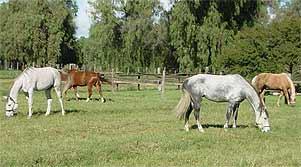As part of the project, which is carried out by Bektochem Laboratory, DNA samples are taken from insured horses to verify the horse's identity in the event of theft, injury, illness or death

The director of the DNA project at the Bektochem laboratory, Dr. Aviv Kahana, said that the advantage of the method is the low cost of entering the horses into the DNA database, since genetic testing is only performed in the event of an insurance event. Since the DNA is unique to each animal, a profile comparison between DNA from the pool and DNA from the sick or stolen horse will unequivocally prove the horse's identity.
In addition to preventing insurance fraud, in the event that the horse is stolen and is found in the possession of the thief, it is possible with the help of cross-referencing the DNA data to prove the theft and thus the thief will not be able to claim that it is a different horse. The genetic evidence is decisive proof that enables the criminalization of the thieves.
The horse breeding industry is exposed to deception by the insurance companies due to the high price of the horses, which can reach up to tens of thousands of dollars for a fine thoroughbred horse. The false claims cause the premiums to go up, which ultimately hurts the horse owners. The DNA tests will result in the company paying for real insurance events, so that ultimately the premiums will decrease and the number of insured horses can increase.
